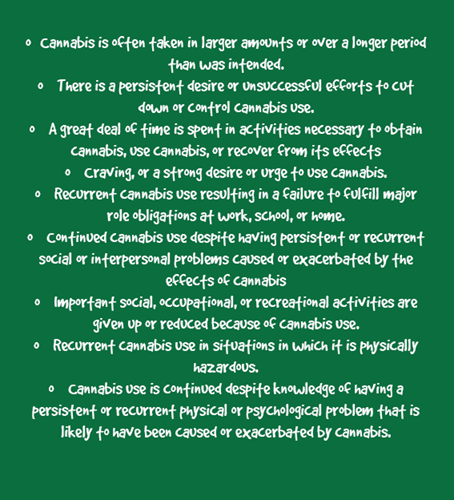5 indicators you might be addicted to weed
Your mates might have told you its impossible to get addicted to weed. Or it s only a mentally addictive drug and its easy to quit if you just have the determination. At NCPIC, we also hear the classic line: I could quit anytime I wanted to quite a bit; just as we’ve always heard from tobacco smokers. To help you work out whether your cannabis use might be putting you at risk for addiction and make quitting more difficult if you decided you wanted to go that way keep on reading.
Your mates might have told you its impossible to get addicted to weed. Or its only a mentally addictive drug and its easy to quit if you just have the determination. At NCPIC, we also hear the classic line: I could quit anytime I wanted to quite a bit; just as we’ve always heard from tobacco smokers. To help you work out whether your cannabis use might be putting you at risk for addiction and make quitting more difficult if you decided you wanted to go that way keep on reading.
Can you actually get addicted to weed?
Let s first clear up a little confusion.
Yes, you absolutely can get addicted to cannabis. Whats called Cannabis Use Disorder has mental and physical signs and symptoms. You can read more about that in our factsheet about cannabis and dependence.
The bottom line of addiction is loss of control over cannabis use. Examples of this are continuing to use even though you know it is doing you harm in aspects of your life such as health, psychological well-being, responsibilities at work or family life; and using larger quantities and/or for longer periods despite your best intentions. As well as craving related symptoms, just like other drugs, there are two common physical signs. The first to develop is tolerance to its effects. As the brain adapts to having the active ingredient THC interacting with receptors, the effects are lessened so the dose needs to increase to get the same effect. After periods of almost daily use, especially of very potent forms of the drug, it is hard to get intoxicated like the first few times of use. As tolerance develops the flip side is withdrawal. When use is stopped, when tolerance is in play, the body has to slam the adaption into reverse and as the brain tries to manufacture its own much milder THC like chemicals the signs and symptoms of withdrawal will be felt. It makes sense that some of these are the opposite to the drug effects, for example, loss of appetite instead of the munchies. During this period someone might also experience cravings to use, irritability and even anger, sleep problems, nausea and appetite loss, nightmares, anxiety or depressive symptoms.
Here are five simple questions that will help you start thinking about how dependent you might be on weed. If you want to get a better indication of addiction, try our addiction quiz.
1. Do you use more than you intend to?
If you plan on having three cones after work and that three quickly becomes four or five after a particularly stressful day, or that $20 a week you committed to has consistently become $30 or even more, this might point to a developing addiction. Other coping mechanisms and healthy behaviours need to replace using weed as a crutch.
2. Do you have a desire to stop using or cut down, but you can’t seem to succeed?
It’s pretty hard to resist that cake being passed around after lunch and say oh well, diet starts tomorrow . For many weed users it s the same. They know they should cut down or quit, and they want to, and perhaps they’ve tried many times, but they haven’t stuck it out. They might have managed a weekend or a few months or even longer, but delaying their quit date or changing the rules is more convenient and the easy option. Changing any behaviour is hard, we get it. The best thing to do is admit this and work out your quit plan or just start with a goal to cut down.
3. Do you spend a lot of time acquiring, using or recovering from weed?
Dealer wants you to drive 45 minutes to meet up? Need to think about when and where you will get weed if you go on holidays? You prioritise weed budget ahead of household expenses or even holidays? All strong signs you re a little too weed-obsessed. Try thinking about what you would be doing if you weren’t spending a portion of everyday stoned or chopping up weed. You’ve got more potential than that!
4. Do you give up important activities to use weed instead?
You know you really should go to your good mates BBQ, or your sisters birthday, or the work Christmas party, but all you feel like doing is staying home and getting stoned. You probably feel a little guilty about not going, so you smoke some more to hide that feeling. If you have a book of excuses ready to avoid special events, think about what you re really avoiding and why.
5. Do you use weed even when it s known to cause problems?
Perhaps someone has told you that you need to stop, or you don’t like yourself when you re stoned, or you ve been in trouble with the law already. If in some way you know that weed is a problem for you and you haven’t stopped using it, that s a strong sign of addiction.






